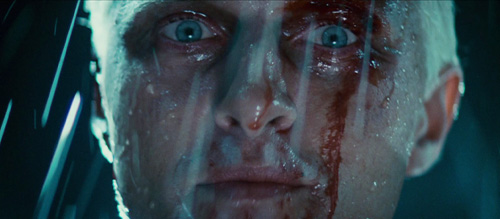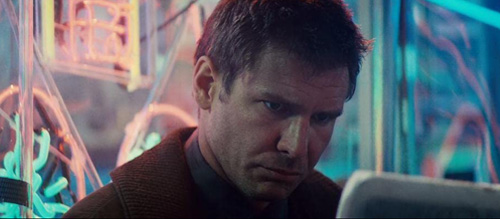‘Blade Runner’ at 40 – Review
Blade Runner (1982)
Director: Ridley Scott
Screenwriters: Hampton Fancher, David Peoples
Starring: Harrison Ford, Rutger Hauer, Sean Young, Daryl Hannah, Brion James, Edward James Olmos, M. Emmet Walsh, Joe Turkel, William Sanderson, Joanna Cassidy
A troubled production, luke-warm reception at the time of release, several different cuts, a name borrowed off a completely different novel, and a legacy to last a lifetime in its genre and beyond. Blade Runner, the archetypal cyberpunk film, the visual landscape of a thousand dreams and hallucinations of the future, the inspiration of so many that came after, may have now slipped into an ‘alternative future’ rather than ‘futuristic prediction’ as its near-future date of 2019 has been and gone, but it has lost none of its potency all these years later. In the sprawling, neon-soaked, perpetually-rainy grime of Los Angeles, Harrison Ford’s Rick Deckard, a retired robot bounty hunter (referred to as a Blade Runner), is tasked with tracking down and retiring a quartet of renegade replicants, artificial people who broke away from their owners on the off-world colonies and have made their way back to Earth. As Deckard says, “Replicants are like any other machine. They’re either a benefit or a hazard. If they’re a benefit it’s not my problem.”
Reportedly, Blade Runner (or at least one its original cuts) was shown to novel-writer Philip K. Dick a few months before he passed. After ten minutes of footage, he turned around to director Ridley Scott and said “How is this possible? You’ve been in my head! This is exactly what I saw!” Indeed, the landscape of the world (mostly designed by legendary futurist Syd Mead, who would eventually work on films such as Tron, Short Circuit, and Aliens) is one of the most arresting aspects of the film. Dazzling and decrepit in equal measure, the giant Coca-Cola and Atari advertisements against the smoky cityscape capture the imagination, the neon umbrellas lighting up the passers-by with ghostly illumination. It brings what Bruce Sterling would later describe cyberpunk as, ‘high-tech, low-life’, into sharp reality. The world is a character in itself, the police cars (spinners) uniquely designed and beautiful. Combined with Vangelis’ haunting synth score, the world of Blade Runner is an atmosphere unlike anything else. That everything is practical, shot for real through a real lens by Douglas Trumbull’s SFX wizard-hands, gives it a tactile, physical dimension that few films have come close to matching.
Harrison Ford’s bounty hunter perfectly straddles that line between action hero and emotional individual. He gets depressed, he gets tired, he gets injured, and yet he still goes about his business with gusto. Ford reportedly disliked Scott for not giving him enough instruction with his character, though this hardly translates to the screen, as he gives a performance worthy of anyone’s CV. And though the other cast are all equally perfect in their roles, the standout of all standouts must and should rightly be Rutger Hauer’s Roy Batty. Leader of the replicant crew, his emotional drive and search simply to have more life, to acquire what he feels was unfairly robbed of him, his time ticking away and his impending death coming like a black shadow, gives the film an unrivalled level of heart and humanity (ironically coming from a non-human character). This all leads to a final confrontation with Deckard, a chase through the ruined apartments of the Bradbury building, which gives all the dirty, grimy, animalistic fighting one could ever need.

And then, on the rooftops near the final moments of the film, Hauer delivers his immortal ‘Tears in the rain’ speech, a monologue that has stood the test of time as one of the best ever put to film. It is pure emotion, a reflection on time and mortality and the end of all things, a search for life put short by the inevitable end we must all face. With the exquisite, BAFTA-winning cinematography of Jordan Cronenweth, and Scott’s direction one of the best examples of his career, this moment encapsulates everything that Blade Runner stands for. It is a discussion of what it means to be human, how technology affects the human experience, and how we all try to make meaning of the world around us before facing the long sleep.
Some might say that the pacing is a little slow, taking a back seat to the visuals, but there lies a misconception because the film, despite having an action set-piece or two, is not an all-out thriller. Action is not its driving force. It is a neo-noir contemplation on life, held in place by the narrative conventions of a detective noir. It is big and bold and majestic and utterly hypnotic, and needs to be seen on the biggest screen possible with the best sound system possible. Blade Runner will live on for future generations and remain as important as it has been these past 40 years, forever one of the best science fiction films ever made.
Score: 24/24


